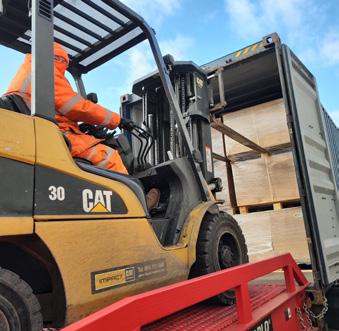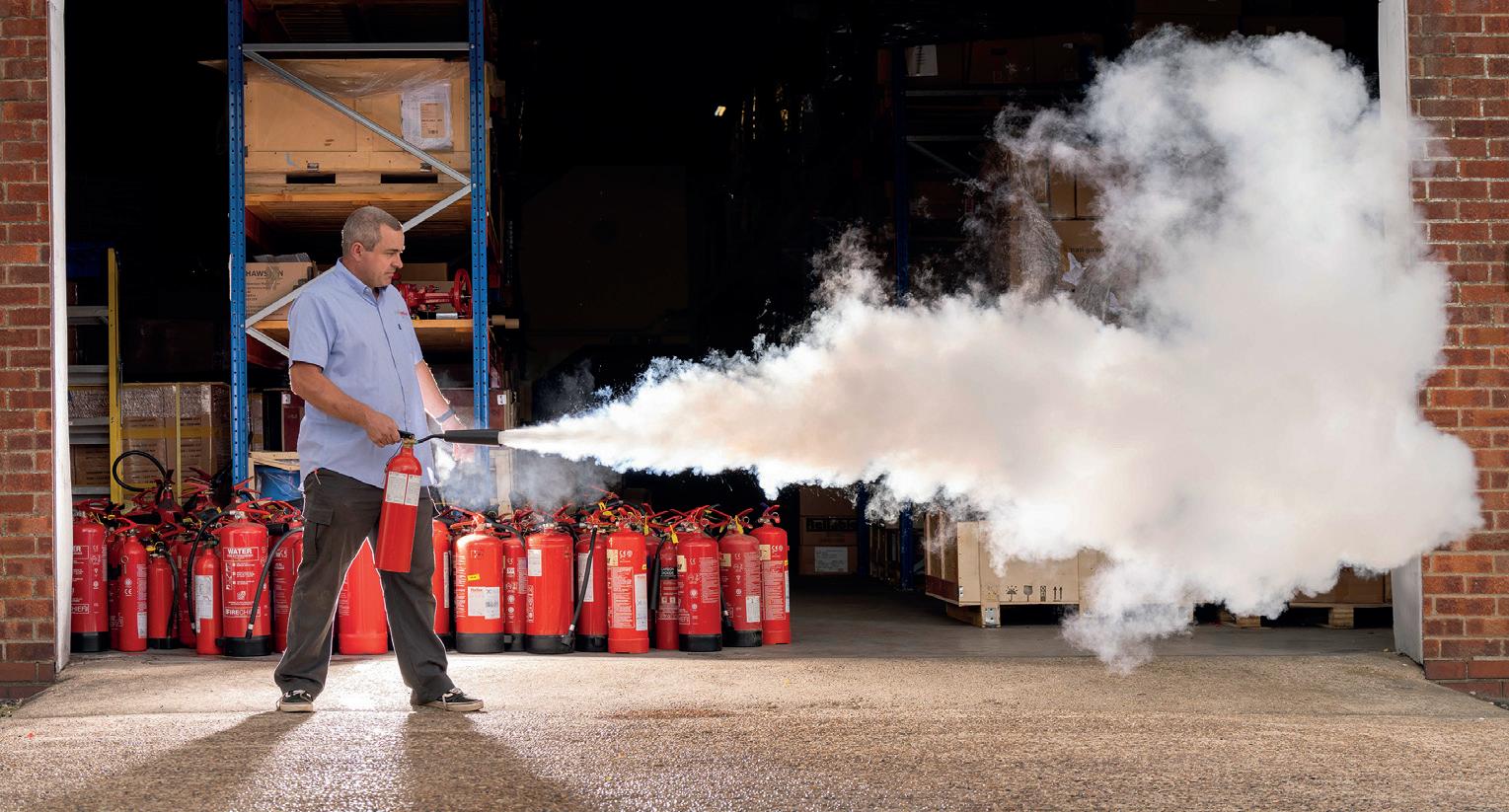
5 minute read
Freight needs a long-term border solution, not Operation Brock, urges Logistics UK
As Operation Brock - a contraflow system designed to keep traffic in Kent moving when there is disruption to travel across the English Channel – once again caused delays to those travelling in Kent and across the UK border last weekend, business group Logistics UK is urging government to find a longer-term solution to protect the UK’s supply chain.
“While the implementation of Operation Brock can help the flow of traffic during peak periods, it disrupts the flow of vehicles – and goods – to and from the Continent and its implementation does not take into account the needs of drivers, who can be stuck in their cabs or cars for hours on end with no food or access to hygiene facilities,” says Nichola Mallon, Head of Trade and Devolved Policy at Logistics UK.
“Leaving vehicles idling at the side of the motorway causes delays and disruption to supply chains, increases operating costs for importers and exporters and will ultimately deter businesses from sending their vehicles to the UK,” she continues. “Our members need a long-term solution to crossing the UK’s borders which keeps freight moving freely, rather than the on again, off again Brock scheme: the constant uncertainty it causes creates unnecessary confusion and delays that are not helpful for the future competitiveness of UK trade.”
As Ms Mallon continues, part of the solution for improved cross-border flows could be found in infrastructure investment. “Road and rail improvements are crucial to help ease congestion heading from the Short Straits and government must act to reduce the economic harms caused by issues on critical parts of the network.
“Following the UK’s departure from the EU, every passport has to be checked. Despite the best efforts of the Port of Dover and Le Shuttle to keep transition times through the border down, these new checks are causing delays at peak passenger periods, and this is even before the new EU Entry and Exit Scheme is introduced next year. “To ensure that freight can move as seamlessly as possible to its final destination, we are urging government to engage with the EU to ensure opportunities for digitisation of documents can be maximised, so that checks can be completed away from the border, reducing the knock-on disruption and delays for goods consignments.
“It is of huge concern that the government has yet to set out a workable model for the Short Straits under its new Border Target Operating Model, which will introduce new controls on imports from October this year. Serious questions remain as to whether the Short Straits will be treated as a single point of entry, what charges the government might apply and whether drivers selected for any checks will have the flexibility to stop at either the Border Control Post on the M20 (Sevington) or the A2 (Bastion Point) depending on their route and destination.
“Logistics UK and its members have been pressing for a workable solution at the border since the UK left the EU: after years of talking, it is now time for government to take action to protect the UK’s highly interconnected supply chain.”
The Operation Brock traffic management scheme controls the flow of traffic into and out of the Port of Dover, and has an impact across Kent. When the scheme is in operation, HGVs are queued along the hard shoulder of the M20 until space is available for them in the Channel ports.
Logistics UK is one of the UK’s leading business groups, representing logistics businesses which are vital to keeping the UK trading, and more than seven million people directly employed in the making, selling and moving of goods. With decarbonisation, Brexit, new technology and other disruptive forces driving change in the way goods move across borders and through the supply chain, logistics has never been more important to UK plc. Logistics UK supports, shapes and stands up for safe and efficient logistics, and is the only business group which represents the whole industry, with members from the road, rail, water and air industries, as well as the buyers of freight services such as retailers and manufacturers whose businesses depend on the efficient
Credit Logistics UK
How safe is your external warehouse? Statistics magnify the need for proper fire prevention

Local warehousing firm, GWS, has recently put together research around the rising threat of fire to businesses’ stock levels. Protecting your assets is essential to the future success of any organisation, and safe and secure warehousing is a vital component of your business strategy. However, the risk of fire can have catastrophic effects if not monitored sufficiently.
Immingham-based GWS found in a recent report by GOV.UK that fires in warehouses hit a 5-year high in 2021/2022. In data supplied to the Home Office’s Incident Recording System (IRS) from Fire and Rescue Authorities around the UK, reported fires in 2021/2022 had increased by over 25% on the previous period. With data yet to be produced for 2022/2023, this shines a light on the importance of adequate fire safety measures in warehouse and storage areas.
By prioritising fire safety, you can create a secure working environment to safeguard the safety and well-being of your employees. Every business is responsible for ensuring that each individual feels protected and empowered to feel confident in their daily operations.

Creating a fire safety plan becomes especially crucial in spaces with high ceilings and wideopen areas. Detecting fires can be more difficult under these conditions, which presents a problem for warehouses and storage facilities. However, it’s not impossible. Prioritising early detection of fires significantly reduces the potential risks to individuals, property and products.
With the right expertise and proper equipment, we can make sure that risks are mitigated and that your products are stored safe and sound.
Fire safety is no accident.
The statistics surrounding warehouse fires in the UK highlight the serious requirement to adopt robust fire safety protocols. Conducting comprehensive risk assessments, installing state-of-the-art detection and suppression systems, providing thorough employee training, and promoting well-defined evacuation plans can effectively reduce the risks associated with fires and protect your most valuable assets.
When looking for an external warehouse management company, it is imperative to enquire about their fire safety policy and find out how they protect your products from the risk of fire. Check your contractor’s warehouse credentials, so you have the peace of mind that your product is safe.

Protecting your stock means saving money by preventing damaged or destroyed stock. Furthermore, demonstrating that you are looking after your stock results in reduced costs in your insurance premiums.
A solid warehouse management system should demonstrate excellent fire detection and suppression systems and is supported by a sound organisational plan. State-of-the-art aspirated fire detection systems can detect the early signs of pre-ignition molecules in the air. In addition, a physical presence with security staff monitoring the site 24 hours a day, 7 days a week, adds an extra level of security and protection.
Never forget that fire safety is not just a requirement; it should be a fundamental commitment when trusting someone to look after your product.
Molly Campbell -
Regional Project Manager
campbellm@nationalemployertraining.co.uk
Melissa ShawBusiness Development Consultant shawm@nationalemployertraining.co.uk
Certificate in Warehouse and Storage Principles
Leadership for own team in logistics operations
Manual Handling
Health and Safety management
Effective communication
Forklift truck

Duration: Approximately 14-16 weeks.
Location of delivery: Grimsby Institute or flexible inline with employer needs.
Flexible Warehousing & Storage Solutions
Supporting the Humber ports for all your product handling requirements


• Over 230,000 SQFT of secure, managed warehouse capacity.
• Secure site with 24/7 manned gatehouse and full site CCTV system
• Industry leading fire detection system with external monitoring in every warehouse.
• Bespoke, cloud based warehouse management system, tailored to your product.
• Product handling is what we do. Can we do it for you?
SME contribution of 10% pp Large business contribution of 30% pp Price to be discussed on interest.
Skills Bootcamps – part of the Government’s Lifetime Skills Guarantee, helping everyone gain skills for life.














